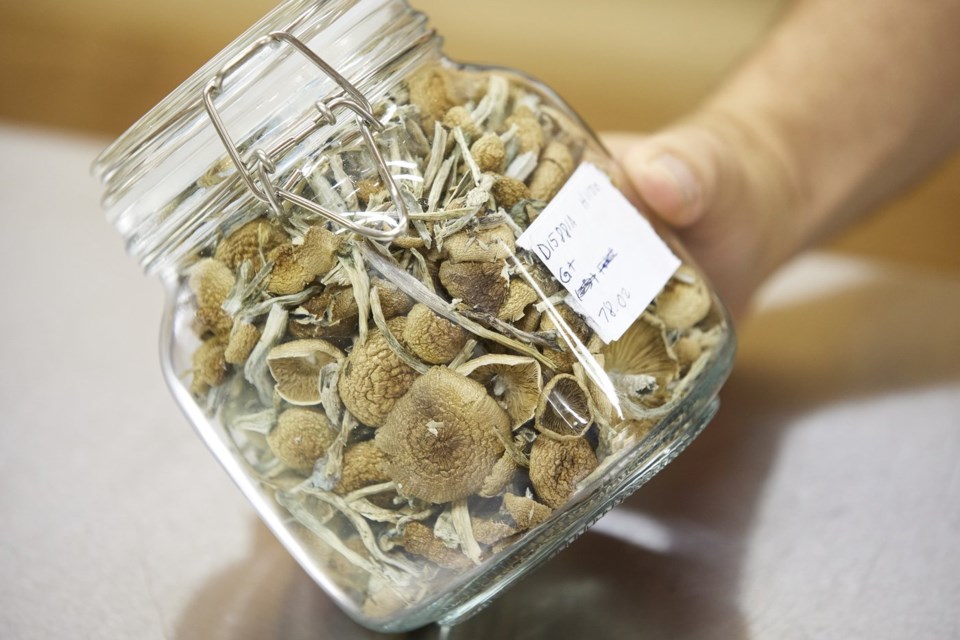OTTAWA — A non-profit group that advocates for access to therapy using psychedelic drugs has won a legal battle in a years-long fight with Health Canada — one the organization believes is far from over.
"There's an obvious societal turning point here, one where the public, for sure, clinicians and certainly parts of the government are waking up to the reality that psychedelics work," said John Gilchrist, director of communications for Therapsil.
Therapsil obtained exemptions under the Controlled Drugs and Substances Act in 2020 that allowed 19 health-care workers to undergo experiential training that involved taking mushrooms containing psilocybin, also known as magic mushrooms.
In 2022, Therapsil applied for exemptions for 93 more health-care workers as it worked to expand access to psilocybin-assisted psychotherapy. Health Canada denied the application.
The case made its way late last fall to the Federal Court of Appeal, which ruled in June that the health minister failed to provide justification for refusing the second round of exemptions. The court ordered the government to make a new decision.
The panel of three judges wrote that "the shift in policy between 2020 and 2022 and the minister's appreciation of the relevant factors are significant, if not abrupt, and call for some explanation."
Gilchrist said the group is prepared to keep fighting in court if necessary.
"People are clamouring to use psychedelics and many Canadians are just doing them in the quote-unquote underground," he said, noting that, along with dozens of online retailers, there are brick-and-mortar stores in many cities selling magic mushrooms.
"So it means the patients will go underground, try to solicit the support of practitioners to do psychedelics outside of the scope of (Health Canada's special access program). Or they'll just do it by themselves, which we really, really do not want. And surely Health Canada does not want that either."
Health Canada has approved more than 300 exemptions in recent years to allow people to undergo psilocybin-assisted therapy. This form of therapy is being studied in Canada for use in end-of-life care and for treating some mental health conditions, including treatment-resistant depression and substance use disorder.
Therapsil believes experiencing the effects of the drug is essential to ensuring their health-care providers can guide people through the experience.
A spokesperson for Health Minister Marjorie Michel did not respond to questions about whether the minister has made a new determination in the case or if the government plans to appeal.
A spokesperson for Health Canada said in an emailed statement that the decision to grant an exemption "is based on sufficient evidence to support the requested use, including the drug information available to the (special access program) at the time of the request, as well as evidence of how it would benefit the patient based on their clinical history."
Gilchrist said the ongoing legal fight has parallels to the legalization of medical cannabis.
"First came patients, then came doctors, and then it's courts and then eventually the government just has to cave to this," he said.
Canada was one of the first countries to legalize medical cannabis in 2001. Health Canada began granting exemptions under the Controlled Drugs and Substances Act in 1999.
The industry was tightly regulated, with restrictions on what kind of products could be used and who could grow them. Patients who wanted to use medical cannabis pushed the courts to expand access.
A 2015 Supreme Court decision found that it was unconstitutional to only allow patients to access dried cannabis. A 2016 Federal Court case struck down rules limiting access to licensed producers, and led to a new framework allowing people to produce their own cannabis.
Former prime minister Justin Trudeau's government made cannabis legal for recreational use in the fall of 2018.
Eugene Oscapella, a lawyer who teaches drug policy at the University of Ottawa, said there's been a shift in government policy toward drugs like psilocybin over the last 15 years.
He applauded the role that researchers — including those at the Multidisciplinary Association for Psychedelic Studies in the U.S. — have played in making that change happen.
"I think what we're seeing now is an increasing willingness to look at other substances that have been, and I use this word deliberately, demonized over the decades as being illegal and dangerous and harmful," he said.
Oscapella was part of the coalition that first applied for medical access to cannabis in 1997 and said that was a sort of precursor to the discussion happening now with psychedelics.
"The societal goal should be to look at the potential benefits. How do we maximize the potential benefit of access to these substances while minimizing the potential harms?" he said.
Therapsil says it has a growing wait-list — for both prospective patients hoping to try psilocybin-assisted therapy and health-care providers hoping to get training. Gilchrist said the court case is "more than a lawsuit for us."
"This case is about, is Canada willing to support a safe, legal, and compassionate pathway forward to psychedelic therapy, which is scientifically and ethically backed?" he said.
This report by The Canadian Press was first published July 8, 2025.
Sarah Ritchie, The Canadian Press



